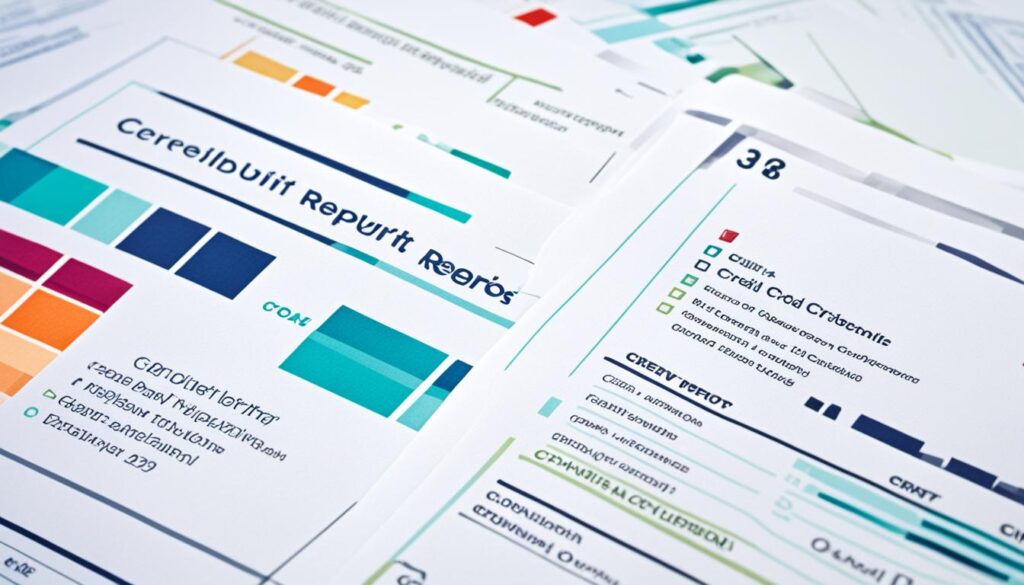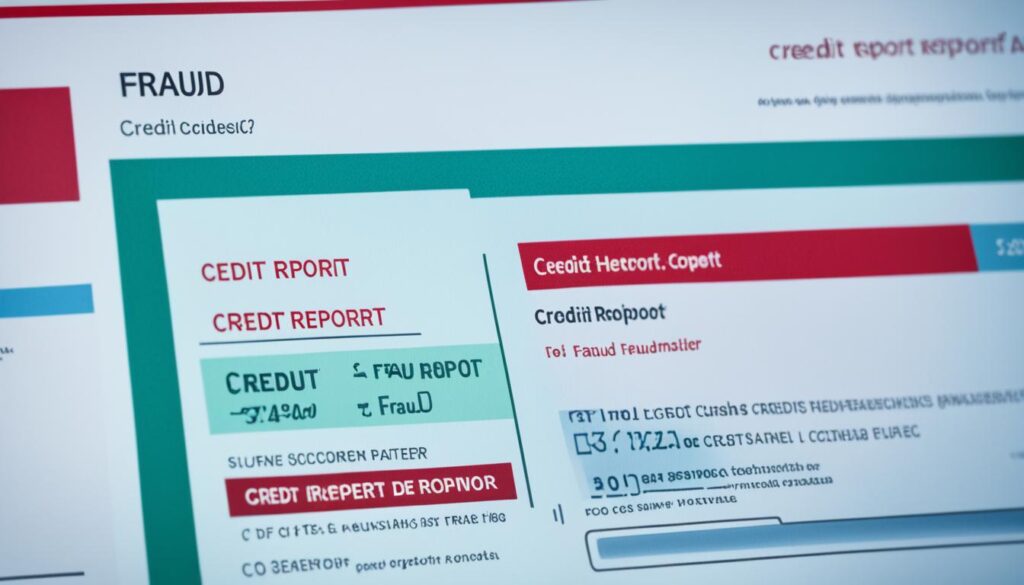Identity theft can wreck your finances. Quick action is vital when you spot fraud on your credit report. This guide will help you dispute identity theft and protect your credit score.
Spotting identity theft early can prevent long-term credit report errors. These steps will equip you to identify, report, and resolve identity theft issues.
Time matters when dealing with identity theft. Act fast to reduce damage and fix your credit. Let’s explore the key steps to dispute identity theft on your credit report.
Key Takeaways
- Act quickly to minimize the impact of identity theft on your credit score
- Obtain and review your credit reports from all major bureaus
- Look for signs of fraudulent activity and document suspicious entries
- File an official identity theft report with the Federal Trade Commission
- Contact credit bureaus and creditors to dispute fraudulent information
- Place a fraud alert on your credit file for added protection
- Stay vigilant and monitor your credit reports regularly
Understanding Identity Theft and Its Impact on Credit Reports
Identity theft can seriously harm your finances. It damages your credit report, making it hard to get loans. Let’s explore this issue and its effects.
What is identity theft?
Identity theft happens when someone steals your personal info for fraud. Thieves might open credit cards or take loans in your name. This can cause big money losses and hurt your reputation.
How identity theft affects your credit report
Fraudsters leave traces on your credit report when they use your identity. This includes fake accounts, credit checks, and missed payments. These bad entries can really hurt your credit score.
It’s important to use credit monitoring services to spot weird activity early. This can help protect your financial future.
Common signs of identity theft on credit reports
Knowing the signs of identity theft helps you act fast. Look out for these red flags:
- Unfamiliar accounts or credit inquiries
- Sudden drops in your credit score
- Incorrect personal information
- Unexplained debt collections
If you see these signs, put fraud alerts on your credit file. Seek help for identity theft victims right away. Quick action can reduce damage and protect your finances.
| Impact | Short-term Effects | Long-term Consequences |
|---|---|---|
| Credit Score | Sudden drop | Difficulty obtaining loans |
| Financial Health | Unauthorized charges | Long-lasting debt issues |
| Personal Security | Stress and anxiety | Ongoing vulnerability to fraud |
Obtaining Your Credit Reports from Major Bureaus
Checking your credit reports is vital for spotting identity theft. You have the right to free annual reports from major credit bureaus. This helps you monitor your credit health and catch unusual activity early.

Visit AnnualCreditReport.com to access reports from Equifax, Experian, and TransUnion. You get one free report from each bureau yearly. Some people space out their requests, checking a different bureau every four months.
When reviewing your reports, look for:
- Accounts you don’t recognize
- Hard inquiries you didn’t authorize
- Wrong personal info
- Sudden drops in your credit score
If you spot issues, start the credit bureaus dispute process quickly. Each bureau has its own method. They must investigate your claims within 30 days.
| Credit Bureau | Online Dispute | Phone Number |
|---|---|---|
| Equifax | equifax.com/personal/disputes | (866) 349-5191 |
| Experian | experian.com/disputes | (888) 397-3742 |
| TransUnion | transunion.com/credit-disputes | (800) 916-8800 |
Stay alert about your credit reports to protect your financial health. Regular checks help you catch and fix issues before they grow.
Identifying Fraudulent Activity on Your Credit Report
Spotting fraud on your credit report is vital for protecting your identity. Regular reviews can catch suspicious entries early. Let’s explore how to spot potential fraud and distinguish it from errors.
Red Flags to Look For
When reviewing your credit report, watch for these warning signs:
- Accounts you don’t recognize
- Incorrect personal information
- Sudden drops in credit score
- Unexplained hard inquiries
- Addresses you’ve never lived at
Errors vs. Identity Theft
Not all credit report discrepancies indicate fraud. Some might be simple mistakes. To tell the difference, look for patterns of suspicious activity.
Check if the error appears on all three credit reports. Contact the creditor directly to confirm account details.
If you’re unsure, consider using credit monitoring services for ongoing protection.
Documenting Suspicious Entries
Keep detailed records of any potential fraudulent activity. Save copies of your credit reports. Note dates, account numbers, and amounts of suspicious transactions.
Record all communication with creditors and credit bureaus. This documentation is crucial for disputing fraudulent entries or filing an identity theft report.
Placing a Fraud Alert on Your Credit File
Protecting your credit is vital when dealing with identity theft. A fraud alert on your credit file is a strong defense. It tells potential creditors to double-check your identity before giving you credit.
This tool is key for identity theft protection. It makes it harder for thieves to open accounts in your name.

- Initial Fraud Alert: Lasts for one year
- Extended Fraud Alert: Remains active for seven years
- Active Duty Alert: For military personnel, valid for one year
To set up a fraud alert, call any major credit bureau. They’ll tell the other two for you. You’ll get a free credit report from each bureau.
This lets you check for any odd activity. It’s a simple way to keep an eye on your credit.
“Fraud alerts are a free and effective first line of defense against identity theft.”
With a fraud alert, the credit dispute process gets easier. Creditors must take extra steps to confirm your identity. This makes it tougher for thieves to use your name.
| Credit Bureau | Phone Number | Website |
|---|---|---|
| Equifax | 1-800-685-1111 | www.equifax.com |
| Experian | 1-888-397-3742 | www.experian.com |
| TransUnion | 1-800-916-8800 | www.transunion.com |
Fraud alerts are just one part of protecting your credit. Stay alert and check your credit reports often. Look for any signs of fraud to keep your credit safe.
Filing an Identity Theft Report with the FTC
Quick action is vital if you suspect identity theft. Filing a report with the Federal Trade Commission (FTC) is crucial. This step protects your rights and starts your credit repair journey.
Steps to File an Official Complaint
To file your report, visit the FTC’s IdentityTheft.gov platform. This user-friendly tool guides you through the process:
- Create an account on IdentityTheft.gov
- Answer questions about your situation
- Get a personalized recovery plan
- Update your report as needed
Importance of the Identity Theft Report
Your Identity Theft Report is a powerful tool. It serves as official proof of the crime. This document is essential for several purposes.
- Disputing fraudulent charges with creditors
- Removing unauthorized accounts from your credit report
- Preventing debt collectors from pursuing fake debts
Using IdentityTheft.gov Platform
The IdentityTheft.gov platform offers more than just reporting. It provides valuable resources for victims of identity theft.
- Step-by-step recovery plans
- Pre-filled letters and forms for creditors
- Tracking tools to monitor your progress
These features make it a crucial resource for identity theft victims. Remember, patience is key when working through your recovery plan. Credit repair takes time, but persistence will help restore your financial health.
How to Dispute Identity Theft on Credit Report
Disputing identity theft on your credit report is vital for reclaiming your financial identity. The process can be complex, but with the right strategies, you can navigate it successfully. Let’s explore the steps to dispute identity theft and protect your credit score.

Start by collecting all evidence of the identity theft. This includes police reports and free credit analysis results. Contact each credit bureau individually to begin the dispute process.
When filing your dispute, be clear and brief. Explain which items on your report are fraudulent and provide supporting documents. The Fair Credit Reporting Act protects your right to remove inaccurate information.
“A well-documented dispute can significantly improve your chances of removing fraudulent entries from your credit report.”
Check in with the credit bureaus regularly about your dispute status. If fraudulent items remain, you might need to escalate your case or seek legal help.
| Credit Bureau | Dispute Method | Response Time |
|---|---|---|
| Equifax | Online, Mail, Phone | 30-45 days |
| Experian | Online, Mail | 30-45 days |
| TransUnion | Online, Mail, Phone | 30-45 days |
Persistence is key in the credit bureaus dispute process. Keep detailed records of all communications. Continue to monitor your credit report for any new suspicious activity.
Contacting Creditors and Debt Collectors
Reaching out to creditors and debt collectors is vital for identity theft victims. This step helps clear fraudulent accounts from your record. It’s a key part of credit repair strategies.
Informing Creditors about Fraudulent Accounts
Contact each creditor where a fake account was opened. Tell them you’re an identity theft victim and ask to close the account. Provide a copy of your FTC Identity Theft Report as proof.
Keep detailed records of all communications. These records may be useful in the future.
Requesting Account Closures and Removals
Ask creditors to remove fake accounts from your credit report. They should send a letter confirming the account closure. The letter should state they won’t report it to credit bureaus.
If they refuse, you might need legal help. A lawyer can enforce your rights as an identity theft victim.
Dealing with Debt Collectors for Fraudulent Debts
Tell debt collectors right away if they contact you about fake debts. Send a written dispute with your FTC Identity Theft Report. By law, they must stop collection until they’ve checked your claim.
Follow up regularly to ensure the fake debt is removed from your credit. Stay persistent and vigilant throughout this process.
Consistency is key in resolving identity theft issues. Keep following up until all fake accounts and debts are cleared.
Working with Credit Bureaus to Remove Fraudulent Information
Dealing with identity theft can be a long process. The credit bureaus dispute process is key to cleaning up your credit report. You’ll need to follow up on your disputes and stay persistent.
Credit repair strategies are vital when fixing identity theft issues. Stay organized and keep records of all your communications. If a bureau denies your claim, ask for a reinvestigation.
Identity theft can greatly impact your credit score. As you work through disputes, your score might change. Don’t worry, this is normal.
Removing fraud information from your credit can help your score recover. Patience is key in rebuilding your credit after identity theft.

